Juicing with vegetables is a great way to get the health benefits of consuming more vegetables into your diet. A daily juice provides more energy, increased mental clarity and focus, a stronger immune system, plus a boost in nutrition. Add just one fresh vegetable juice a day to your diet and start reaping the benefits. Read on for making the best healthy juices.
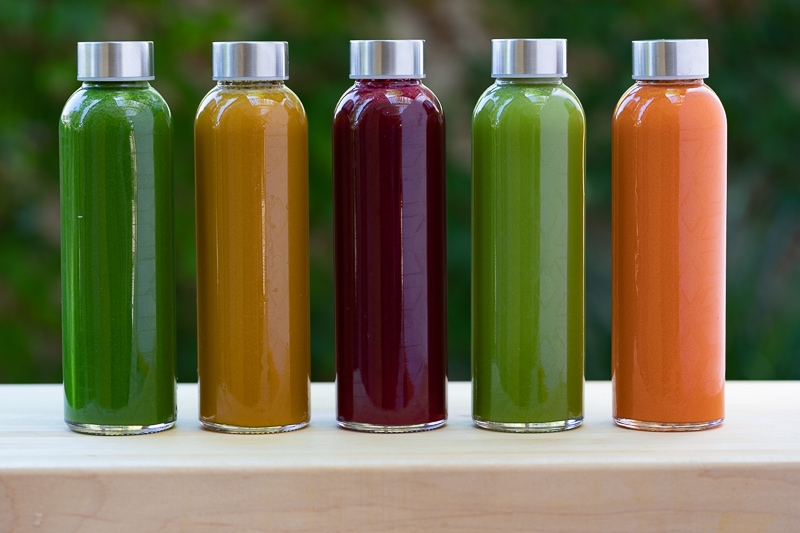
Juicing with vegetables at home is about fresh, cold-pressed juice that is unpasteurized, using vegetable and low sugar fruit whole fruit. I'm talking the real stuff, the good stuff. Good juice. When you are making your own juice at home you know it's fresh.
Jump to:
- The Popularity of Juicing
- Why Juice
- What Health Benefits Can I Expect?
- Why Does Juicing Work?
- The Best Vegetables and Fruits
- Do Juices Retain the Fiber?
- The Naysayers About Juicing
- Is Juicing for Everyone?
- Can I use Juice as Meal Replacements?
- How Far in Advance Can I Prepare Juice?
- How Should I Store Juice?
- Are There Ways to Use Leftover Pulp?
- Questions to Ask Yourself When Considering a Juicer
- What type of Juicer is Best for Me?
- How Do I Start Juicing as a Beginner?
- Can I Juice With a Blender?
- Try These Juice Recipes
- 📖 Recipe
- 💬 Comments
The Popularity of Juicing
With juice bars popping up everywhere, it's impossible to ignore the the skyrocketing popularity of juicing with vegetables. Juicing isn't new; its been around for a long time, and the potential health benefits are amazing when you drink a daily juice.
Using raw fruit and vegetable juices as medical therapy goes back to the 1920's and 1930's. But it was the Juiceman, Jay Kordich, a trailblazer in natural health, that is considered the modern day Father of Juicing. Kordich tributes juicing to his beating cancer, then dedicated his life to spreading the word and teaching juicing.
Why Juice
Daily juice is about adding a single juice a day to your current routine. Daily juice doesn't require you to give up anything. Juicing is in addition to eating a diet rich in fruit, vegetables, and leafy greens, not a replacement. Why? Because you need the fiber, but juicing gives you additional benefits.
Adding a juice a day is much easier than juice fasting or doing a juice cleanse and provides ongoing, long term benefits.
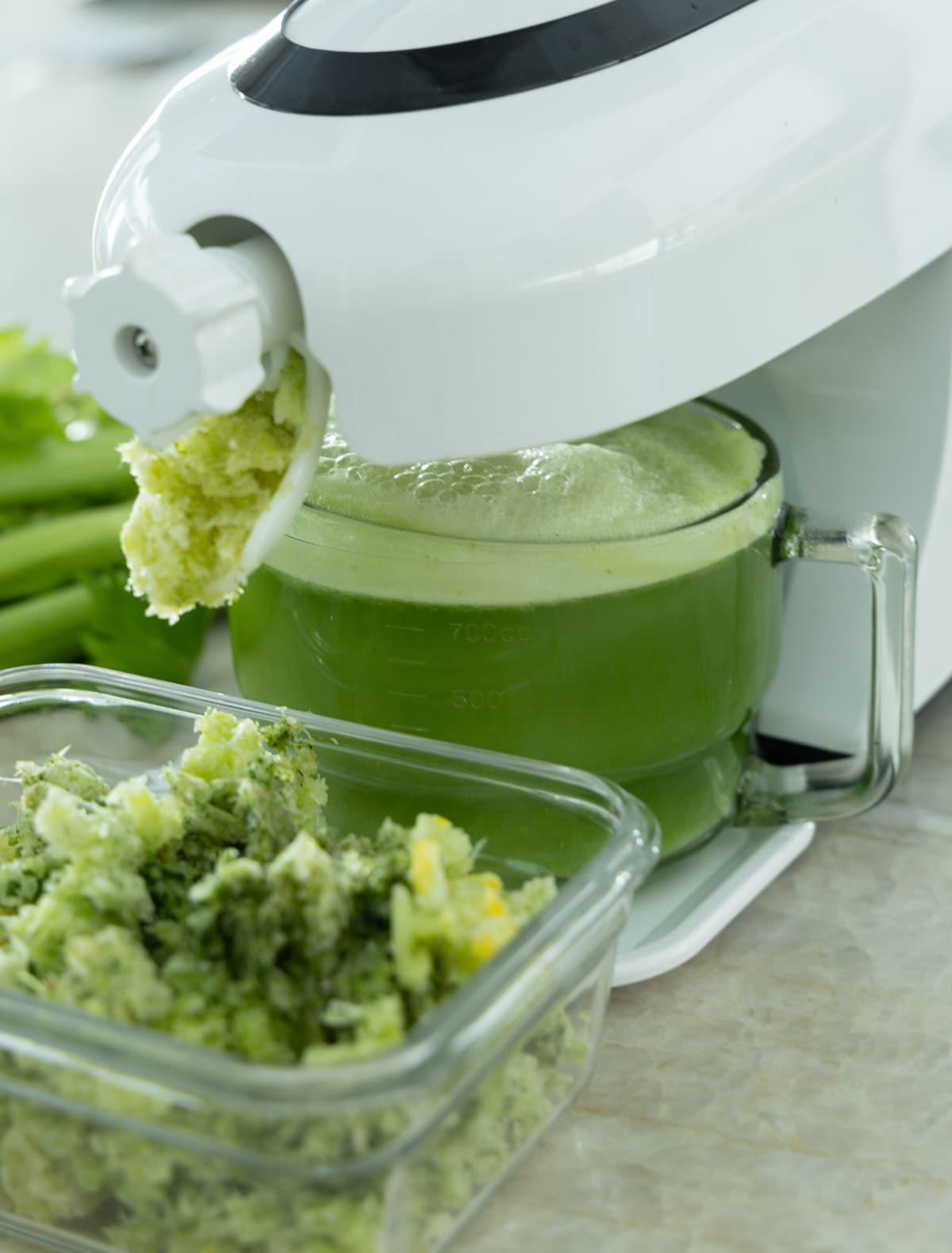
Chef's tip: Why green and green juice? One word: chlorophyll. That beautiful green plant pigment responsible for the absorption of light in the process of photosynthesis creating energy. Read about the many health benefits of chlorophyll here. Just look at the photo above and the vibrant color of that juice! It's a great natural detoxifier.
What Health Benefits Can I Expect?
Here are a few of the health benefits of starting a daily juice program and some interesting studies.
- Increased energy.
- Increased focus and mental clarity.
- Weight loss and weight optimization (as reported in this scientific research article).
- Improved eating habits.
- Greater productivity.
- Healthier aging.
- Reduced food cravings.
- Improved elimination and detoxification.
- Boosted immune function.
- Elimination of afternoon fatigue.
- A healthy replacement for sugary drinks, sodas, and processed juices for kids.
- Juicing to lose weight by replacing one meal a day with a fresh vegetable juice.
- Lower blood pressure, drinking beet juice as noted in this study.
- Might be a potential way to improve cardiovascular health per this study, lowering the risk of heart disease.
Why Does Juicing Work?
It takes 1-2 pounds of produce to make a single juice. By drinking juices, you are adding far more produce to your daily diet than you could ever eat. And because juices are raw, it's considered living food, full of powerful enzymes that are often destroyed with cooking.
Enzymes are the construction workers of the body, while nutrients are the building materials. They speed up chemical reactions in the body. Enzymes are vitally important for maintaining optimal health, and raw fresh juices deliver them in abundance.
Consuming fresh raw juice floods your body with nutrients such as vitamins, minerals and phytonutrients - those special plant compounds that help fight disease and increase health.
The Best Vegetables and Fruits
- Green vegetables such as celery, cucumber, fennel, wheatgrass, and cabbage (with amazing natural sweetness), spinach, broccoli, and bok choy.
- Green leafy vegetables: kale (it's really a cruciferous vegetable), spinach, swiss chard, dandelion greens (very bitter), collard greens, and Romaine lettuce.
- Colorful root and other vegetables such as carrots and beets. You can juice carrot tops but they are a little bitter so start with just a small amount. Try red bell peppers, they are a good source of vitamin C.
- Low-sugar fruits such as tart green Granny Smith apple, pears, kiwis, grapefruit, lemon and limes (which contain d-limonene). For a sweeter apple and resulting juice, a Fuji apple is another good choice.
- Herbs and spices such as fresh ginger root, turmeric root, parsley, cilantro (a terrific detoxer), dill, and mint (which can be strong, start small).
- Melons: Cantaloupe, honeydew and even watermelon are good to juice but higher in sugar. If you are diabetic or looking to lose weight, pass on juicing melons. If you do try juicing them, use the inner rind as well.
Minimize or eliminate high sugar fruits such as pineapple, mangos, and oranges with high sugar content. Most people have no idea that orange juice is almost pure sugar.
If you have any special health concerns or are on certain medications or specific supplements, be sure to check with your healthcare provider for any ingredient limitations.
What about juicing berries? Better to save berries for smoothies, like this blueberry green smoothie, strawberry banana smoothie, or a chocolate blueberry smoothie. At the cost and availability of fresh berries, don't juice them, eat them.
One more thing, buy as much organic as possible and if that is hard, check the Dirty Dozen list. Obviously you want high quality fresh produce for juicing.
Chef's tip: For a delicious summer juice without a juicer, try this Mexican watermelon water with lime. It's fantastic and super hydrating. Have a juicer? Try this watermelon cucumber juice
Do Juices Retain the Fiber?
In short, no, juices have no fiber content. Juicing removes dietary fiber, allowing for fast assimilation by your body. Think of juices as being pre-digested, giving your digestion system a break. The juicer does it for you, relieving your body of the energy it takes to digest food. You reap the benefits.
Fiber is critical in a healthy balanced diet which is why you still need to eat your whole fruits and vegetables and not rely on juicing. Juicing is supplemental to eating your whole fruits and vegetables.
The amount of fiber removed depends on your method of juicing. If there is a small amount of fiber left in your juice, you can leave it or strain it through a fine sieve. No fiber means no digestion process.
The Naysayers About Juicing
A lot of people bash the benefits of juicing. So far, every article I've read fails to mention one major thing: juicing does not replace eating your whole fruits and vegetables. Juicing is in addition (not a replacement) to eating a diet with plenty of fruits and vegetables. Juicing a powerful, healthy supplement to a healthy diet.
Is Juicing for Everyone?
Almost everyone benefits from juicing with vegetables. If you have blood sugar issues, are diabetic, pre-diabetic, or trying to lose weight, stick with low sugar vegetable juices and those with leafy greens.
Again, check with your healthcare provider about any health conditions or concerns and ingredient limitations, especially with greens, which have high vitamin K (not potassium, they are different) content such as kale, collard greens, broccoli, spinach, cabbage, and lettuce.
If you are on blood thinning medications (such as Warfarin), be sure to check with your doctor before changing your diet or consuming green vegetable juices high in vitamin K.
Another caution is for those concerned about oxalate levels. Juices with spinach, beet greens, beets, and chard have particularly high oxalate levels. Check out this article for more information on oxalates. Check with your healthcare provider for limitations.
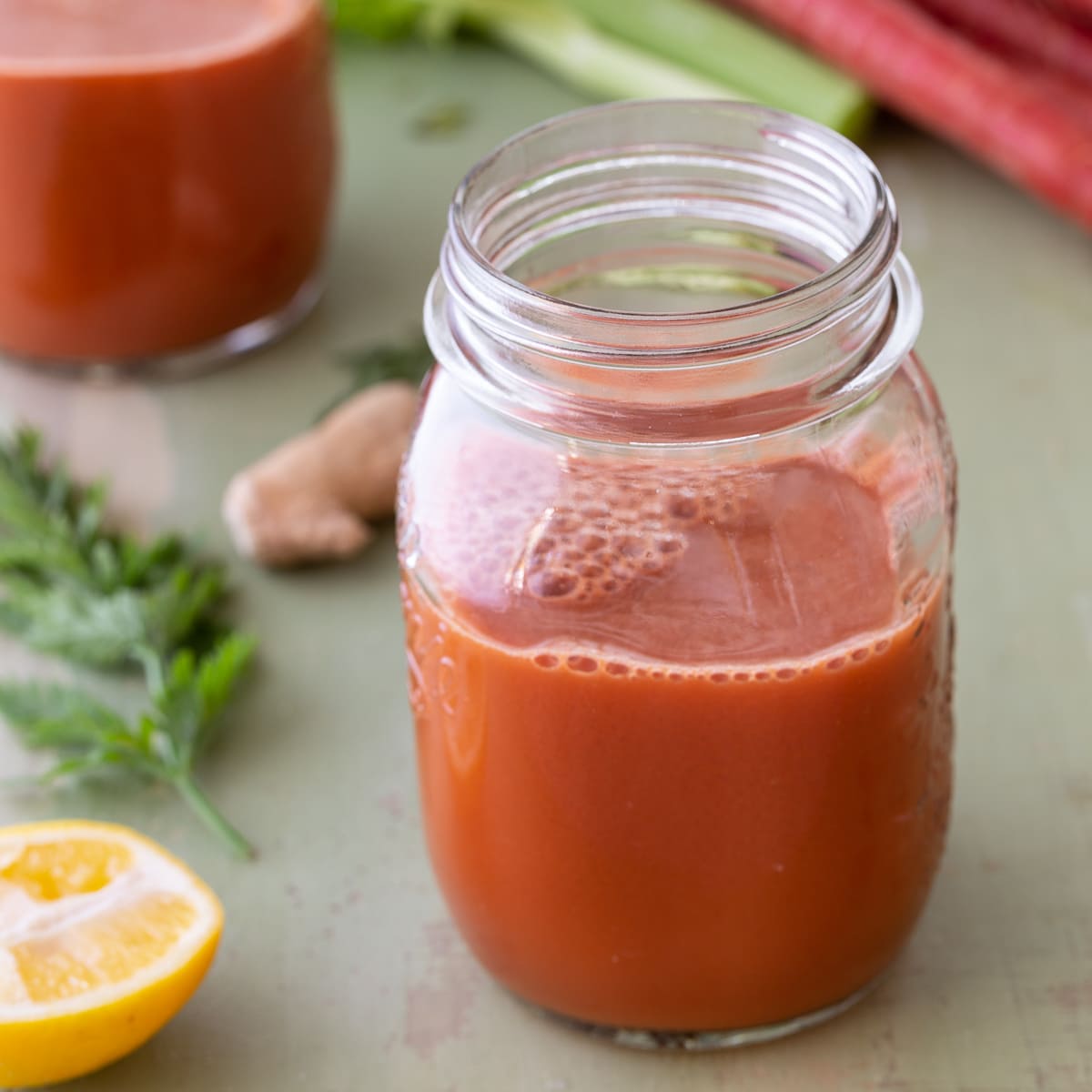
Can I use Juice as Meal Replacements?
If weight loss is your goal (or a little spring cleaning or detoxing), juicing can be used as a meal replacement. Keep in mind that you are not getting other nutrients such as protein if juice is being used as a meal replacement.
I find that juicing gives me great energy, so I don't miss the meal. Sometimes it is also more of a mental thing as eating a meal is often a social activity.
If you are an intermittent faster and are aiming for a longer window of non-eating time in the morning or evening, a fresh juice can help you extend that window.
How Far in Advance Can I Prepare Juice?
How far in advance you can prepare juices depends on your juicer. Most juices are best consumed within 15-20 minutes of being made. See what the manufacturer guide says for your juicer. Drinking within 24 hours is fine if you are juicing ahead for meal prepping, stored in an airtight bottle. For maximum health benefits, drink juice on an empty stomach and wait 20 minutes.
Being able to juice ahead of time with low nutritional loss is one thing I love about my juicer model. I can make juice for 3 days at a time with minimal enzyme and vitamin content loss. For me, that helped justify the investment.
How Should I Store Juice?
Juice is best stored in glass bottles with tight fitting caps. Use either:
It depends on how much you plan to drink. Be sure you fill the bottle up to the very top so there is no air gap. If you are a little short on juice, add filtered water to compensate.
One more tip: Be sure that your refrigerator is cold enough. The FDA lists the temperature as 41°F or below. I recommend keeping your refrigerator between 34°F - 37°F.
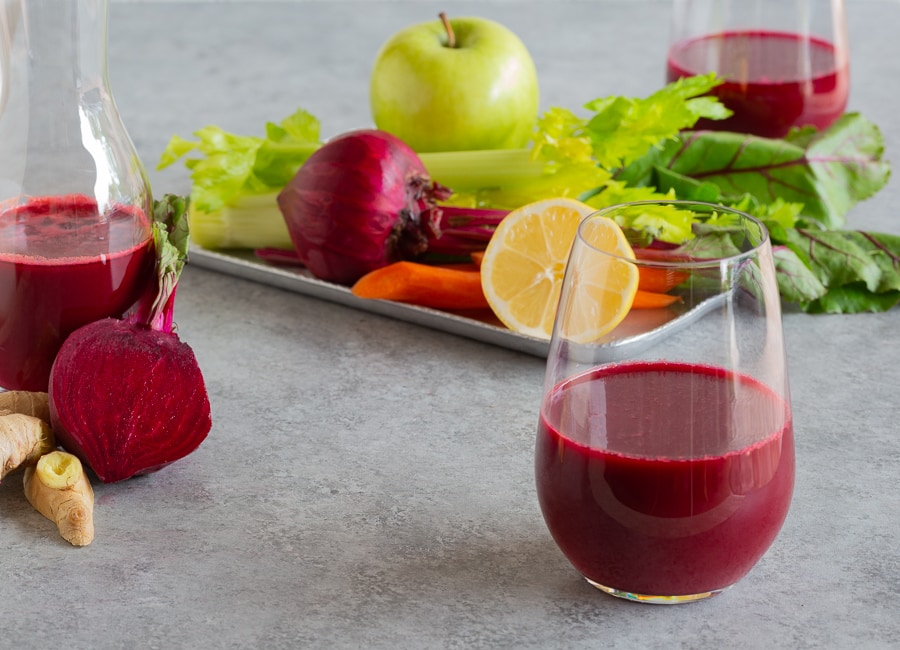
Are There Ways to Use Leftover Pulp?
I've not yet created recipes for using my pulp but am working on adding that wonderful fiber back into burger patties, meatballs, smoothies, dips, and making vegetable broth. Mostly mine goes into compost.
Check out this page on Pinterest for ideas on pulp recipes, and while you are there, check out my pins and follow me on Pinterest too.
Questions to Ask Yourself When Considering a Juicer
- How many people will you be juicing for? You, two, or a family?
- Will you juice every day?
- How big is your kitchen and work area?
- Where will you store your juicer?
- What is your juicer budget?
- Would you prioritize speed or nutritional value?
Chef's tip: To make juicing easier, set a goal to wash your juicing produce all at once when you get home from the store, dry it and store in the refrigerator in containers. It really helps make juicing faster.
What type of Juicer is Best for Me?
Choosing a juicer is entirely a personal decision. There are many juicers on the market and deciding is not easy, so let me share some insight from my experience. There are two main types of electric juicers: centrifugal juicers and masticating juicers. You will also see twin gear juicers.
No matter the brand you choose, a slow, cold-press, masticating juicer (think of the machine chewing for you) for the best quality juices. They preserve more of the important nutrients and get every bit of beautiful juice from your produce, saving you money in the long run. They run a little slower and are more expensive.
My first juicer was a famous centrifugal juicer brand. Many people loved this popular brand so I bought one, but I was not super happy with it. Eventually I learned about slow, cold-pressed juicers and switched to this company. Check out their juicer options as you do your own research on brands. Choose what's best for you. One note - they are great for juicing fibrous celery stalks if you want good celery juice.
Read reviews, look at ratings, and be sure the company has good customer service if you have a problem. I almost invested in a different major brand of juicer until I discovered their customer service was terrible. And be sure to check the warranty period.
Another tip, choose a well established juicing brand. There are a lot of cheap competitors on the market these days that don't produce as good of quality of juice or a quality machine.
This is a mid-range juicer which does a great job. For something less of an investment and smaller, try the economical Shine Juicer. If you're in love with juicing and do daily juice for yourself or juice for a family, look at the Greenstar Elite juicer. It's a fantastic juicer but more of an investment (it's my main juicer). Last time I looked, Amazon did not have the best price so shop around.
Here's a good pros and cons article on juicers.
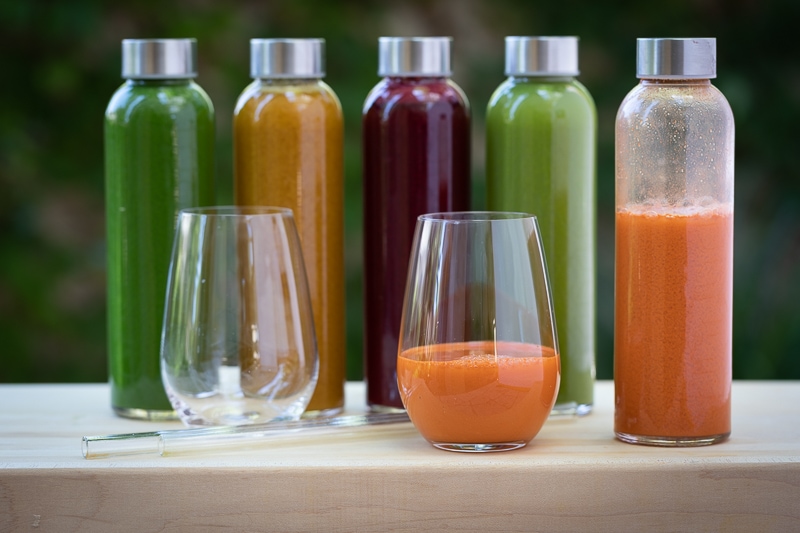
How Do I Start Juicing as a Beginner?
First, decide on your juicer. Read the manual well. Start with simple juices with just a few ingredients. When you gain experience and you know what you like vary your juices. Varying ingredients is good so you get a variety of nutrients.
Start with simple, common juicing ingredients such as celery, cucumber, carrots, green apples, lemon (either a half or whole) and a little ginger. Next, branch out into leafy greens, beets, herbs, and more. Try different recipes to see what tastes good and you enjoy.
Chef's tip: While organic produce can cost more, it's the best option for juicing. And be sure to use a good produce wash like the one I've used for years.
Can I Juice With a Blender?
It's not optimal, but if you just can't afford a juicer, it's way to start while saving for a juicer. Using a blender, your juice yields won't be as high. Juicers come in many prices ranges and sizes starting as low as around $100. Pretty economical. So before you think you can't afford one, shop around.
Look around garage sales or on local online sales groups. Some people start juicing but can't stick with it and sell their juicers. Just be sure it works.
To get juice from blender, chop vegetables and fruits small, add to a blender with a little water (just enough to make it work), blend as smooth as possible, then strain with a nut milk bag or other very fine strainer.
Try These Juice Recipes
Wonder if celery juice is hype or healing? Here's some food for thought on celery juice. Beet juice? Carrot juice? Yes please.
📖 Recipe
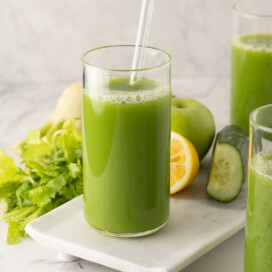
Simple Basic Green Juice
Equipment
- preferably an electric juicer
Ingredients
- 2 ribs celery
- 2 Persian or mini cucumber or half a field or English cucumber
- ½ lemon
- ½ inch knob of fresh ginger
- handful fresh parsley or cilantro
Instructions
- Wash produce well, prepare as outlined in the manufacturers handbook and process the vegetables for juice. Drink within 15-20 minutes for the best nutrition and quality, depending on your juicers capabilities.
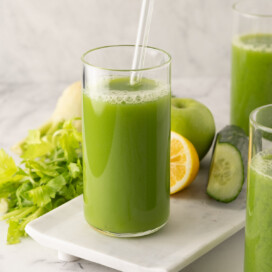
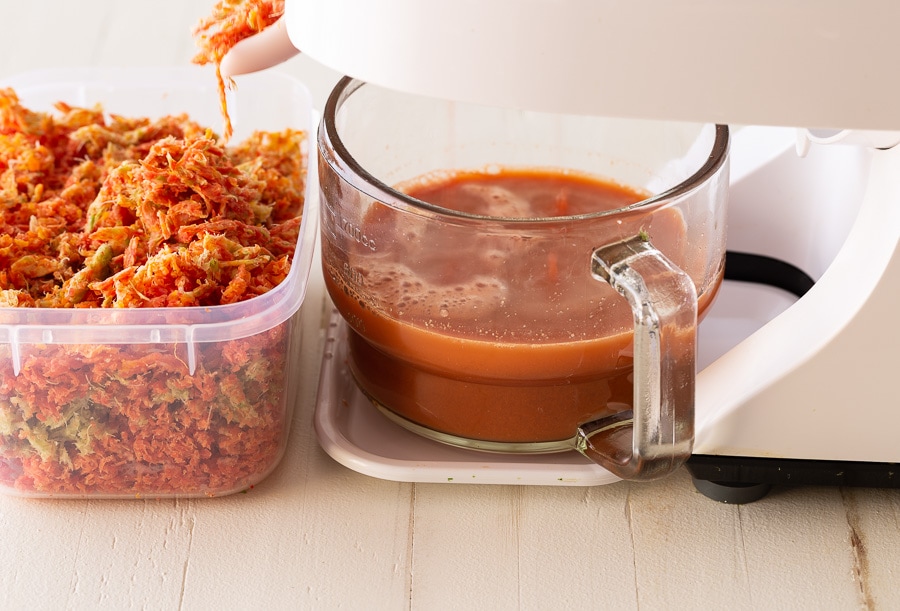
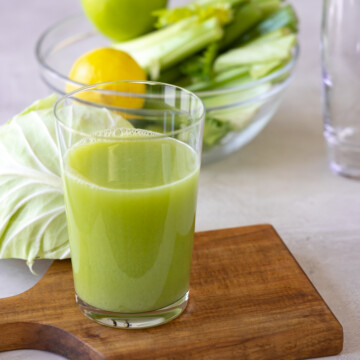
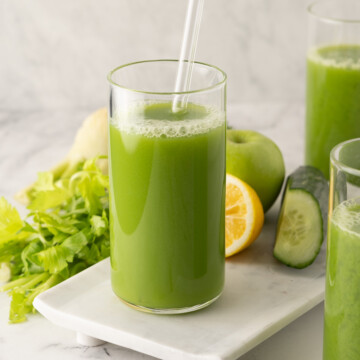
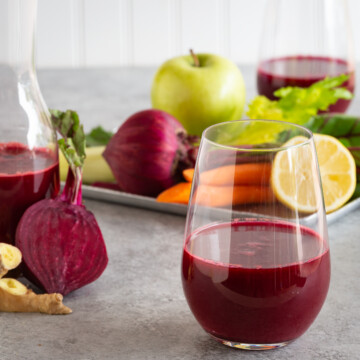
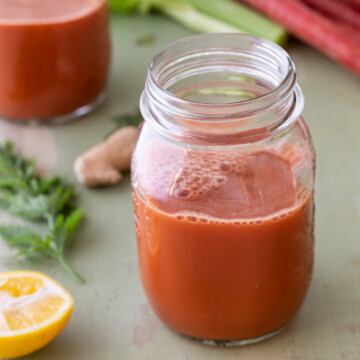
Olivia Smart says
Thank you for explaining that juicing every day can help give you increased energy and greater productivity. My husband has been thinking about switching from drinking coffee in the mornings to something a bit healthier. I wonder if he'd be interested in having some juice instead and see how that makes a difference for him.
Sally Cameron says
Hi Olivia. On coffee versus juicing. Drinking a little coffee in the morning is not inherently unhealthy, in fact many studies show the benefits of drinking coffee. Be sure it's good quality coffee, we buy organic and grind ourselves (check out Thanksgivingcoffee.com). And don't use a lot of sugar or fake "creamer" product containing poor quality ingredients. Then again, a juice is energizing, tastes great and especially nice in warmer weather. With juices, I make homemade because you can totally control what goes into it. Many store brands are quite high in sugar. A green juice would be super. Try it and see how he feels!
Shammy Peterson says
It sure was helpful when you said that your body could benefit from nutrients such as vitamins, minerals, and phytonutrients when you consume fresh raw juices. With this in mind, I will consider shopping for fruit drinks that can boost my immune system and help me enjoy good drinks as well. I want to find a type of fruit drink that I can enjoy at any time of the day, so I will consider your tips.
Sally Cameron says
Hi Shammy. The best way to accomplish this is make your own juice. Check out the juicers from Tribest.com. They make them at several price points for all budgets and kitchen sizes. "Fruit drinks" at the store sounds questionable to me. Read labels like a hawk. Homemade is best! No preservatives or pressure pasteurization and you control the (all real) ingredients.
Beatriz Carabello says
I am interested in juicing and eating healthy ,